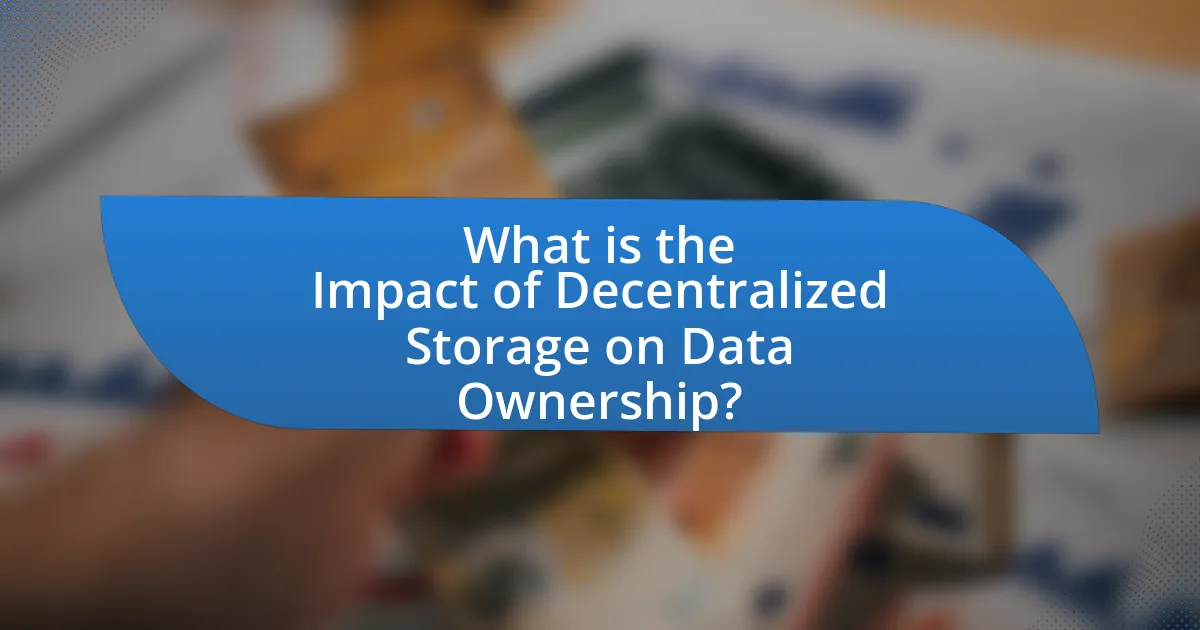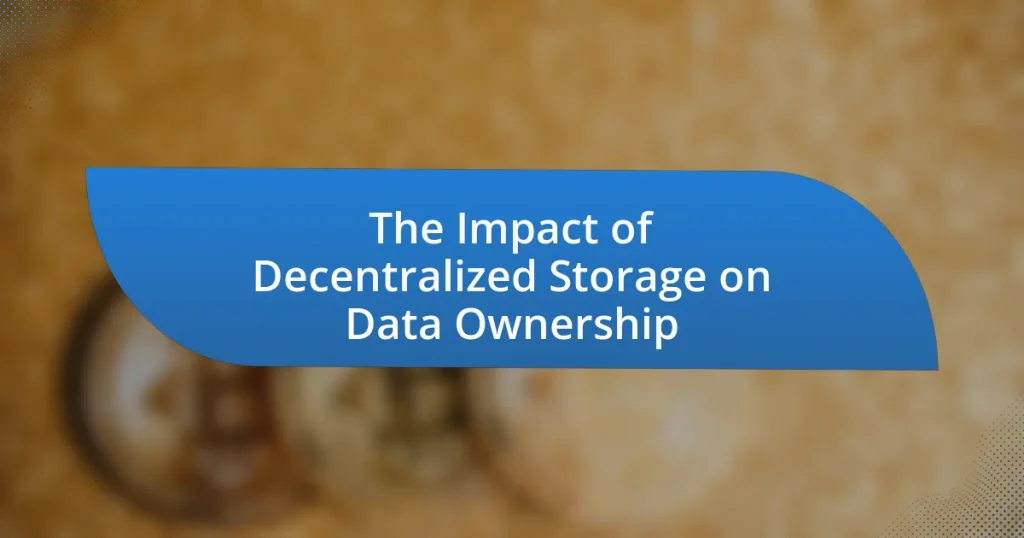Decentralized storage is a transformative approach to data ownership that empowers individuals by allowing them to control their data without reliance on centralized entities. This article explores how decentralized storage redefines data ownership through principles such as data distribution, redundancy, and user control, enhancing privacy and security. It examines the differences between decentralized and traditional storage models, the importance of data ownership in the digital age, and the implications for individuals and organizations. Additionally, the article addresses the challenges and security concerns associated with decentralized storage, regulatory impacts, and future trends that could reshape data ownership. Best practices for users to maintain effective data ownership in decentralized environments are also discussed.

What is the Impact of Decentralized Storage on Data Ownership?
Decentralized storage significantly enhances data ownership by allowing individuals to retain control over their data without reliance on centralized entities. This model shifts the power dynamics, enabling users to manage their own data through distributed networks, which reduces the risk of data breaches and unauthorized access. According to a study by the European Union Agency for Cybersecurity, decentralized systems can improve data security by eliminating single points of failure, thereby empowering users with greater autonomy and privacy over their information.
How does decentralized storage redefine data ownership?
Decentralized storage redefines data ownership by enabling individuals to retain control over their data without reliance on centralized entities. In traditional storage systems, data is often controlled by service providers, leading to potential privacy concerns and loss of ownership. Decentralized storage utilizes blockchain technology and peer-to-peer networks, allowing users to store data across multiple nodes, ensuring that no single entity has complete control. This shift empowers users to manage their own data, enhancing privacy and security, as evidenced by the rise of platforms like IPFS and Filecoin, which facilitate decentralized data storage and retrieval.
What are the key principles of decentralized storage?
The key principles of decentralized storage include data distribution, redundancy, and user control. Data distribution ensures that files are stored across multiple nodes rather than a single central server, enhancing accessibility and resilience. Redundancy involves creating multiple copies of data across different locations, which protects against data loss and increases reliability. User control empowers individuals to manage their own data without reliance on centralized authorities, fostering privacy and ownership. These principles collectively enhance security, reduce the risk of data breaches, and promote a more equitable data ecosystem.
How does decentralized storage differ from traditional storage models?
Decentralized storage differs from traditional storage models primarily in its architecture and control mechanisms. In decentralized storage, data is distributed across multiple nodes in a network, reducing reliance on a single point of failure, while traditional storage typically relies on centralized servers that manage and store data. This distribution enhances data security and resilience, as seen in systems like IPFS (InterPlanetary File System), which utilizes a peer-to-peer network to store and retrieve files. Additionally, decentralized storage often empowers users with greater control over their data, as they can manage access permissions directly, contrasting with traditional models where service providers dictate data access and ownership.
Why is data ownership important in the digital age?
Data ownership is crucial in the digital age because it empowers individuals and organizations to control their personal and sensitive information. This control is essential for privacy protection, as unauthorized access to data can lead to identity theft, financial loss, and reputational damage. According to a 2021 report by the Identity Theft Resource Center, there were over 1,800 data breaches in the United States alone, exposing millions of records and highlighting the risks associated with data mismanagement. Furthermore, data ownership fosters trust between users and service providers, as individuals are more likely to engage with platforms that respect their data rights. In summary, data ownership is vital for safeguarding privacy, enhancing security, and building trust in an increasingly digital world.
What are the implications of data ownership for individuals?
Data ownership for individuals implies control over personal information, enabling them to manage how their data is collected, used, and shared. This control can lead to enhanced privacy, as individuals can decide who accesses their data and for what purposes. Furthermore, data ownership can empower individuals economically, as they may monetize their data through platforms that allow them to sell or share it on their terms. According to a report by the World Economic Forum, individuals who own their data can potentially benefit from a more equitable digital economy, where they are compensated for their contributions. Thus, the implications of data ownership extend to privacy, economic empowerment, and the overall balance of power in the digital landscape.
How does data ownership affect businesses and organizations?
Data ownership significantly impacts businesses and organizations by determining control over data usage, access, and compliance with regulations. When organizations own their data, they can leverage it for strategic decision-making, enhance customer relationships, and maintain competitive advantages. For instance, a study by McKinsey & Company found that companies that effectively utilize data ownership can increase their profitability by up to 15%. Furthermore, data ownership ensures compliance with regulations such as GDPR, which mandates strict data handling practices, thereby reducing the risk of legal penalties and enhancing trust with customers.
What challenges does decentralized storage present for data ownership?
Decentralized storage presents significant challenges for data ownership, primarily due to issues of control, security, and legal jurisdiction. In decentralized systems, data is distributed across multiple nodes, making it difficult for individuals to assert ownership and control over their information. This fragmentation can lead to complications in data retrieval and management, as users may not know where their data is stored or who has access to it. Additionally, the lack of a central authority complicates the enforcement of data protection laws, as jurisdiction becomes ambiguous when data is stored across different geographical locations. These factors collectively undermine the clarity and security of data ownership in decentralized storage environments.
What security concerns arise with decentralized storage?
Decentralized storage presents several security concerns, primarily including data integrity, unauthorized access, and lack of regulatory oversight. Data integrity can be compromised due to the distributed nature of storage, where multiple nodes may hold different versions of the same data, leading to inconsistencies. Unauthorized access is a risk because decentralized systems often rely on cryptographic keys for security; if these keys are lost or stolen, sensitive data can be exposed. Furthermore, the absence of centralized control means that there is often no clear accountability or regulatory framework to address breaches or data loss, making it difficult to enforce security measures effectively. These concerns highlight the complexities and vulnerabilities associated with decentralized storage solutions.
How do regulatory issues impact decentralized storage and data ownership?
Regulatory issues significantly impact decentralized storage and data ownership by creating legal frameworks that dictate how data can be stored, accessed, and controlled. For instance, regulations such as the General Data Protection Regulation (GDPR) in Europe impose strict guidelines on data privacy and ownership, affecting how decentralized storage solutions manage user data. These regulations require that individuals have control over their personal data, which can conflict with the inherent characteristics of decentralized systems that prioritize anonymity and distributed control. Furthermore, compliance with such regulations can lead to increased operational costs for decentralized storage providers, as they must implement mechanisms to ensure data protection and user rights, thereby influencing the overall viability and adoption of decentralized storage solutions.
How can decentralized storage enhance data ownership?
Decentralized storage enhances data ownership by allowing individuals to retain control over their data without reliance on centralized entities. In decentralized systems, data is distributed across multiple nodes, ensuring that no single party has complete authority or access, which mitigates risks of data breaches and unauthorized usage. For instance, platforms like IPFS (InterPlanetary File System) enable users to store and share files in a way that preserves ownership rights, as users can manage their own encryption keys and access permissions. This model empowers users to dictate how their data is used and shared, reinforcing their ownership and privacy.
What role does blockchain technology play in decentralized storage?
Blockchain technology serves as the foundational framework for decentralized storage by providing a secure, immutable ledger that enables data to be stored across a distributed network. This decentralization enhances data ownership by allowing users to maintain control over their information without relying on a central authority. Each piece of data is encrypted and linked to a unique cryptographic hash, ensuring that any alterations are easily detectable. Furthermore, blockchain’s consensus mechanisms, such as proof of work or proof of stake, validate transactions and data integrity, reinforcing trust among users. This structure not only protects against data breaches but also empowers individuals with greater autonomy over their digital assets, aligning with the principles of decentralized storage.
How can users maintain control over their data with decentralized storage?
Users can maintain control over their data with decentralized storage by utilizing encryption and distributed ledger technology. Decentralized storage systems, such as IPFS or Filecoin, allow users to encrypt their data before uploading it, ensuring that only they possess the decryption keys. This encryption prevents unauthorized access and enhances privacy. Additionally, the use of distributed ledger technology ensures that data is stored across multiple nodes, reducing the risk of data loss and providing users with ownership rights that are not dependent on a single entity. This structure empowers users to manage their data independently, as they can choose where and how their data is stored and shared, reinforcing their control over personal information.
What are the future trends in decentralized storage and data ownership?
Future trends in decentralized storage and data ownership include increased adoption of blockchain technology, enhanced privacy features, and the rise of user-centric data models. Blockchain technology facilitates secure, transparent transactions and data integrity, which is essential for decentralized storage solutions. Enhanced privacy features, such as zero-knowledge proofs, are being integrated to allow users to maintain control over their data while still enabling verification processes. Additionally, user-centric data models empower individuals to own and monetize their data, shifting the power dynamics from centralized entities to users themselves. These trends are supported by the growing demand for data sovereignty and privacy regulations, such as GDPR, which emphasize the importance of individual data rights.
How might advancements in technology influence decentralized storage?
Advancements in technology will significantly enhance decentralized storage by improving data security, increasing efficiency, and enabling greater scalability. For instance, the development of blockchain technology has already provided a secure method for data verification and integrity, which is crucial for decentralized systems. Additionally, innovations in artificial intelligence and machine learning can optimize data retrieval processes, making decentralized storage more user-friendly and efficient. Furthermore, advancements in network infrastructure, such as 5G, will facilitate faster data transfer speeds, thereby enhancing the overall performance of decentralized storage solutions. These technological improvements collectively contribute to a more robust and accessible decentralized storage ecosystem, ultimately empowering users with greater control over their data ownership.
What potential developments could reshape data ownership in the coming years?
Decentralized storage technologies, such as blockchain and distributed ledger systems, could significantly reshape data ownership in the coming years by enabling individuals to maintain control over their personal data. These technologies allow users to store data across a network of computers rather than on centralized servers, reducing the risk of data breaches and unauthorized access. For instance, blockchain’s immutable nature ensures that once data is recorded, it cannot be altered without consensus, thereby enhancing data integrity and ownership verification. Additionally, the rise of data tokenization could empower users to monetize their data directly, creating a new economy around personal information. According to a report by the World Economic Forum, by 2025, it is estimated that 10% of global GDP will be stored on blockchain technology, indicating a significant shift towards decentralized data ownership models.
What best practices should users follow for effective data ownership in decentralized storage?
Users should follow best practices such as maintaining strong encryption, regularly updating access controls, and ensuring data redundancy for effective data ownership in decentralized storage. Strong encryption protects data from unauthorized access, while regular updates to access controls ensure that only authorized users can access sensitive information. Additionally, implementing data redundancy across multiple nodes enhances data availability and resilience against loss. These practices are essential as they align with the principles of decentralized storage, which emphasizes user control and security over personal data.


